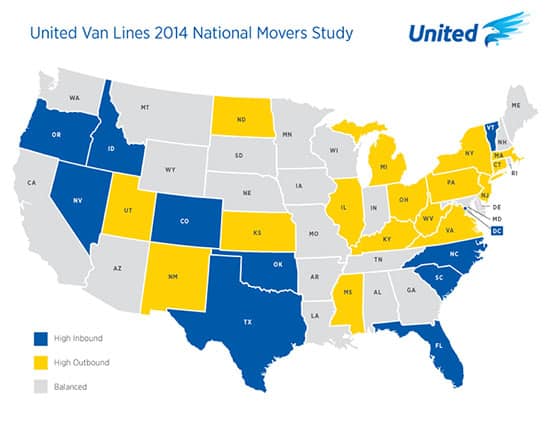Vermont ranks number four on the list of Top Moving Destinations of 2014, according to the 2014 Annual National Movers Study released by United Van Lines, the nation’s largest mover. In 2014, more residents were moving into Vermont than out of Vermont with 59 percent of moves being inbound.
Oregon holds on to its title as “Top Moving Destination” and continues to pull away from the pack, while the Northeast loses residents for the third consecutive year. Vermont is a newcomer to the inbound list this year. In a survey of its customers, United found that 37 percent of people moving to Vermont were doing so because of a new job.
Those are the key findings from United Van Lines’ 38th Annual National Movers Study, which tracks customers’ migration patterns state-to-state during the course of the past year. The study found that Oregon is the top moving destination of 2014, with 66 percent of moves being inbound — that’s a nearly 5 percent increase of inbound moves compared to 2013. Arriving at Number 2 on the list was South Carolina (61 percent inbound), followed closely in third by its northern neighbor, North Carolina (61 percent).
The District of Columbia, which held the top spot on the inbound list from 2008 to 2012 and ranked fourth last year, fell to number 7 this year with 57 percent inbound moves. New additions to the 2014 top inbound list include Vermont (59 percent), Oklahoma (57 percent) and Idaho (56 percent).
The top-10 inbound states of 2014 were:
Oregon
South Carolina
North Carolina
Vermont
Florida
Nevada
Texas
District of Columbia
Oklahoma
Idaho
The study also showed residents are continuing to flee the Northeast with states including New Jersey, New York and Connecticut making the list of top outbound states for the third consecutive year.
The top outbound states for 2014 were:
1. New Jersey
2. New York
3. Illinois
4. North Dakota
5. West Virginia
6. Ohio
7. Kansas
8. New Mexico
9. Pennsylvania
10. Connecticut
In addition to the Northeast, Illinois (63 percent) held steady at the No. 3 spot, ranking in the top five for outbound moves in the last six years.
New additions to the 2014 top outbound list include North Dakota (61 percent), Ohio (59 percent) and Kansas (58 percent).
Retiring
In a separate survey of its customers, United Van Lines found the Northeast region also had the highest number of people leaving for retirement with more than one in four respondents indicating retirement as the reason for relocation. The Mountain West had the highest number of retirees moving to the region with nearly one in three individuals surveyed saying they relocated there to retire.
“We’ve been tracking the number of inbound and outbound domestic moves for nearly four decades, and through our data are able to identify the most and least popular states for residential relocation year after year. This year we also surveyed customers to determine why they were relocating,” said Melissa Sullivan, director of marketing communications at United Van Lines. “As the nation’s largest household goods mover, United Van Lines shipment and survey data paints an accurate reflection of the overall U.S. state-to-state moving trends.”
“With economic stability growing nationally, the current migration patterns reflect longer-term trends of movement to the southern and western states, especially to those where housing costs are relatively lower, climates are more temperate and job growth has been at or above the national average, among other factors,” said Michael Stoll, economist, professor and chair of the Department of Public Policy at the University of California, Los Angeles. “Unique amenities such as outdoor recreation, arts and entertainment activities, and green space protection likely continue to propel Oregon to the top of the list for the second straight year.”
United has tracked migration patterns annually on a state-by-state basis since 1977. For 2014, the study is based on household moves handled by United within the 48 contiguous states and Washington, D.C. United classifies states as “high inbound” if 55 percent or more of the moves are going into a state, “high outbound” if 55 percent or more moves were coming out of a state or “balanced” if the difference between inbound and outbound is negligible.




